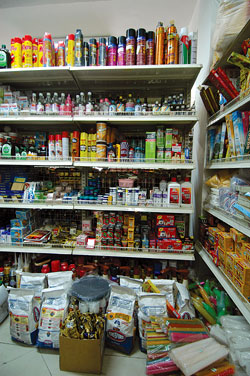|
|
You don't need to go far afield from Nepal to see the kinds of business opportunities available. In the metropolis of Siliguri, the second largest city in West Bengal, many are switching to the business of direct import from China.
Chinese goods used to find their way there from Kathmandu and Dhulabari through the porous border of Kakarbhitta. Now, over 70 Siliguri businesses make more than a dozen trips each to Guangdong every year, bringing in consignments directly to the markets in north and northeast India. These shipments are sent out from Shanghai straight to the Kolkata port.
The goods available there are of superior quality, similar to what's in western stores. Merchandising is one of the most critical parts of retail and import businesses. But the Nepali predilection for mediocrity has left us with cheap goods, rather than attractive and durable ones. The Beed repeats ad nauseum that three decades ago Kathmandu boasted a supermarket that sold quality stuff from around the world. We're no longer a destination for the best global brands of watches, perfumes, or electronics. Such businesses were pillars of the parallel economy, so it is difficult to find statistics, but talk to the traders in the tax haven of Indrachok and you'll get enough evidence of a slump.
If we want trade with India to matter again, we'll have to be innovative. In Nepal, our approaches to trade and transit issues are superficial. Money is poured into study after study that yield nothing substantial.
We consider the opening of the Nathu La in Sikkim for trade with Tibet a major blow for Nepal's economy. Not true. Traders in Siliguri will still get their stuff from Kolkata, as transit through Nathu La is three times more expensive and more time consuming than the sea route, and the road is shut for seven months in a year.
Our own plans for a transit corridor with special economic zones thrown in should not be deterred by the opening of this route. If maintained well, our Tatopani route provides a better transit corridor for goods to move between China, Nepal, and India.
Nepal can benefit most from serving the northeastern and northern states of India. The markets and buying behaviour of Shillong or Kohima have more similarities with Kathmadu's markets than those in Bangalore or Chennai.
Our businesspeople must understand the fundamentals of supply and demand. Okay, so trade is our forte. Well, then let's develop comparative and competitive advantages in trade. Why can't we have world class merchandising outfits that understand consumer behaviour and what works best in which market? Our trade networks with China or Taiwan are the oldest. Let's revive them to our best advantage. Markets demand superior quality goods, so why shouldn't we procure them, and also work on educating consumers? We lose businesses like consumer electronics because we do not believe in providing or honouring worldwide warranties.
Business is affected not by major changes but small ones that people hardly notice.




